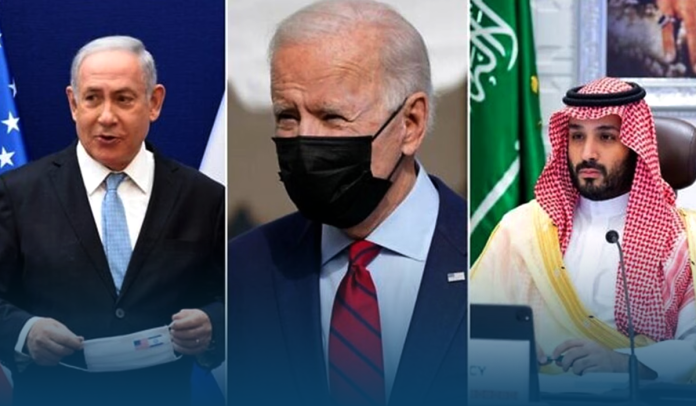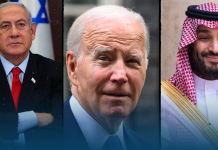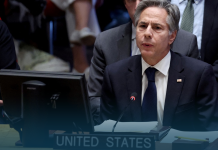The Palestinians seek substantial financial support of hundreds of millions of dollars and greater authority over land in the occupied West Bank as part of a potential three-way agreement between the US, Saudi Arabia, and Israel, according to reliable sources. Palestinian officials held talks with Saudi authorities in Riyadh, Saudi Arabia, on Wednesday. It is expected that those officials would meet American officials. The United States has been trying for a long to establish a landmark deal between Saudi Arabia and Israel. Washington would underwrite it, including a major security deal sought by the Saudis. However, significant obstacles hinder the prospects of such agreements, keeping them far away.
“There are no expected announcements or breakthroughs in the near future,” stated National Security Advisor Jake Sullivan on Tuesday. There is hope for a significant shift in Middle Eastern relations, but the details of any potential agreement remain uncertain. American officials have been engaging in shuttle diplomacy, traveling to Riyadh, Amman, and Jerusalem over the summer to continue negotiations. Despite these efforts, there are still obstacles to overcome. President Biden will likely see a deal between Saudi Arabia and Israel as a foreign policy win that he can present to voters before the next election.
Saudi Arabia is considered the head of the Islamic and Arab world and has not recognized the Israeli state since its creation in 1948. Taking the influence of Saudi Arabia, many other Islamic states refused to recognize Israel. If the ties between Riyadh and Jerusalem go successful and the Saudi State recognizes Israel, it would be a big diplomatic victory for the United States, for which it has been pushing for years.
Netanyahu Is Hopeful For The Successful Deal
Israeli Prime Minister Benjamin Netanyahu expressed last month that there is a possibility they would see history changing. It is also anticipated that any possible deal would face an international backlash. Saudi Arabia also wants to benefit from the potential deal and has put considerable demands in return for recognizing Israel. Riyadh has demanded guarantees of advanced American-made weapons and a civil nuclear programme, including in-country uranium enrichment. Israel seeks to benefit from trade and defense ties with the Gulf superpower and historic integration sought in the region following normalization deals brokered in 2020.
To gain the support of his Democratic Party, President Biden must demonstrate that he has made significant progress in advocating for the rights of Palestinians. Many party members are opposed to offering incentives to Saudi Arabia due to the country’s poor human rights record and involvement in the Yemen conflict. Additionally, they are against rewarding Israel’s current governing coalition, which they believe is further escalating tensions in the West Bank and causing turmoil within Israel.
MBS May Face Challenges
Diana Buttu, a former legal adviser to the Palestinian negotiating team in previous peace talks with Israel, noted that Saudi Arabia is now showing interest in participating in the defense agreements. The ties being discussed primarily revolve around security and trade. Looking ahead to 2023, these negotiations will go on. Before the deal becomes successful, it should also be seen if Palestinian rights and benefits are protected. There is a big Palestinian favor and support in the Islamic world, especially Saudi Arabia, so Muhammad Bin Salman has to make his public agree to recognize Israel, which seems a bigger challenge. He should also ensure that the rights of Palestinians are not abolished, and there is a big part for them as well.
According to a senior Palestinian official who is aware of the discussions, a group of high-ranking Palestinian officials met with Musaed al-Aiban, Saudi Arabia’s national security adviser, in Riyadh on Wednesday.

Source: Web
Palestinian official listed their demands
During last week’s meeting with US Assistant Secretary of State Barbara Leaf in Amman, the Palestinian official listed their demands for engaging with the American-backed process.
- Transfer control of Israeli-controlled West Bank areas (Area C under the 1990s Oslo peace accords) to the Palestinian Authority.
- There should be a complete stop to the growth of Israeli settlements in the West Bank.
- Saudi Arabia will resume its financial support for the Palestinian Authority with an annual budget of around $200m (£160m). The support had slowed down since 2016 and was stopped completely three years ago.
- President Donald Trump closed the US consulate in Jerusalem that served Palestinian diplomatic missions. It should now be reopened.
- US-brokered negotiations between Israel and the Palestinians should resume from where they left off in 2014 under then-Secretary of State John Kerry.
The concessions made by the Palestinians towards Saudi-Israel normalization have been deemed significant by some, though the Americans view them as surpassing. However, these privileges differ greatly from the official Palestinian stance, which is to reject any normalization unless it leads to the creation of an independent state.








